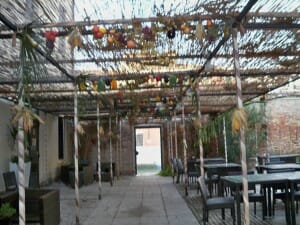
The Jewish festival of Sukkot begins on the fifth day after Yom Kippur. Although the holiday dates back to biblical times, few are familiar with this joyous Jewish holiday. Home celebrations include the building and decorating of a temporary structure called a sukkah. A prominent feature of this simple building is the ability to see stars through the roof that is usually covered with branches. Adults and children decorate the sukkah with items associated with a harvest. It is customary for Jews to eat and sometimes sleep in the sukkah during the weeklong holiday.
Colorful picture books can be used to introduce children from all backgrounds to this joyous fall festival. All add to the belief that cultural diversity should be shared and appreciated by everyone. As children learn about diverse traditions, they become more tolerant of people’s differences. It is important for children from minority groups, including Jewish children, to be given opportunities to share their customs and traditions in a public school setting.
The House on the Roof: A Sukkot Story. By David A. Adler and Illustrated by Marilyn Hirsh. (1976) Looking at the copyright date, one can see that this is a timeless classic. Adler created a bit of mystery as he showed the main character bringing a variety of items into his apartment building. Conflict immediately developed between this man and the owner of the building. The owner doesn’t want him bringing in odds and ends or damaging the hallway or stairwell. Midway through the book, the mystery is revealed. The man has constructed a sukkah on the roof of his building. The conflict intensifies when the apartment owner takes court action. This story not only highlights how Jews celebrate Sukkot, but it also sheds light on how people can become intolerant of people’s differences.
The Vanishing Gourds: A Sukkot Mystery. By Susan Axe-Bronk and Illustrated by Marta Monelli (2012) Jewish children find pleasure in celebrating Sukkot. Sara, the main character, exhibits absolute joy when she celebrates one of her favorite Jewish holidays. Interacting with nature is part of any outdoor adventure. Sara learns first-hand that the harvest vegetables that decorate her sukkah are desired by a neighborhood squirrel. A hungry squirrel smashes the gourds. Math skills will be reinforced as the number of gourds is reduced. Sara recognizes the squirrel’s needs. As a result, she leaves food for him. The seeds from the gourds ultimately germinate in time for the next festival. Intertwining nature and basic math skills into this story makes the story very appealing to a secular young audience.
The Mysterious Guests: A Sukkot Story. By Eric Kimmel and illustrated by Katya Kremina. (2008) While the underlying message of this story is valuable, some secular teachers may shy away from using a book that has a few generic references to the Bible. According to Jewish tradition, Abraham, Isaac, and Jacob mysteriously appear as guests at each sukkah. This story focuses on how these men are treated in two contrasting situations and their response. In one location, the host provides a lavishly appointed sukkah with endless food options while the other is more modest. There was no shortage of food in the first scenario, but the host was not gracious and did not show any kindness to the poor. The owner of the second sukkah made everyone feel welcome and did his best to share his limited amount of food with all who came. Not surprising, the three biblical patriarchs rewarded the generous person and the other learned a lesson from his misbehavior.
Tikvah Means Hope By Patricia Polacco. (1996) This picture book is one of my all time favorites. For more information see the blog I posted last year- Tikvah Means Hope- A Charming Classic for Sukkot.
Related Blogs:
8 Gifts for 8 Nights: Jewish Children’s Holiday Books
Chanukah- 2 New Picture Books and a Sweet Potato Recipe
Memorable Holocaust Picture Books
Picture Books for the High Holidays
Purim and Freshly Baked Hamentaschen
Bio
Sandra Bornstein is the author of MAY THIS BE THE BEST YEAR OF YOUR LIFE. It is available on Amazon.
Sandra’s memoir highlights her living and teaching adventure in Bangalore, India. She is a licensed Colorado teacher who has taught K-12 students in the United States and abroad as well as college level courses. Sandra is married and has four adult sons.
The memoir was a finalist in the Travel category for the 2013 Next Generation Indie Book Awards, the 2013 International Book Awards, the 2013 National Indie Book Excellence Awards, 2013 USA Best Book Awards, and a Honorable Mention award in the Multicultural Non-Fiction category for the 2013 Global ebook Awards.
Leave a Reply
You must be logged in to post a comment.